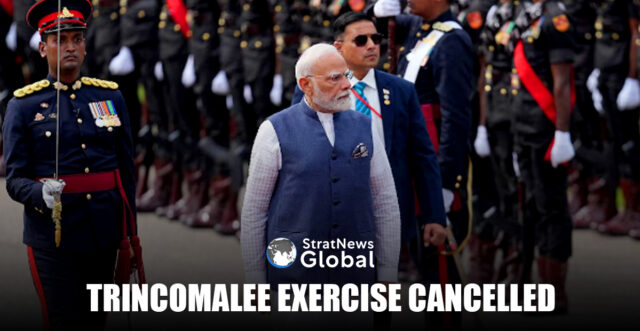A planned joint naval drill between Pakistan and Sri Lanka near the strategically important Trincomalee harbour was quietly cancelled several weeks ago following objections from India, according to media reports.
The naval drill, part of routine military ties between Sri Lanka and Pakistan, was shelved following New Delhi’s intervention.
The timing—just ahead of Prime Minister Narendra Modi’s visit to Colombo—heightened India’s concerns.
While there was no official announcement from Sri Lanka or Pakistan, it is understood that “India communicated its apprehensions directly to Sri Lankan authorities, prompting the cancellation.”
Trincomalee Harbour
Trincomalee harbour, located on Sri Lanka’s northeastern coast, is one of the world’s finest natural deep-water ports. It is considered a strategic asset with the potential to dominate the Bay of Bengal and the northeast Indian Ocean.
Its strategic position along vital Indian Ocean sea lanes makes it a key asset for maritime trade and naval operations.
The harbour’s depth and size allow it to accommodate large vessels, enhancing its potential as a major logistical and refuelling hub.
Trincomalee also holds strategic military significance, attracting interest from regional powers like India and China.
Its proximity to important shipping routes and regional chokepoints increases its geopolitical value, positioning it as a critical node in the Indo-Pacific’s evolving security and trade architecture.
India’s Concerns
Experts suggest India’s unease stemmed from Pakistan’s close naval ties with China, raising the possibility of increased Chinese maritime presence through Pakistani warships.
India has had prior concerns—such as the docking of China’s tracking ship Yuan Wang in Hambantota in 2022 and another Chinese vessel in Colombo a year later.
In recent years, India has stepped up its strategic engagement in Sri Lanka, especially in Trincomalee, with plans to develop the area into a regional energy hub.
During Modi’s visit, India, Sri Lanka, and the UAE signed a landmark deal for this purpose.
A defence pact was also inked, institutionalising military cooperation nearly four decades after relations were strained by the Indian Peace Keeping Force’s intervention.
India has also provided military aid, including a Dornier maritime surveillance aircraft in 2022, to support Sri Lanka’s security needs.
(With inputs from IBNS)





